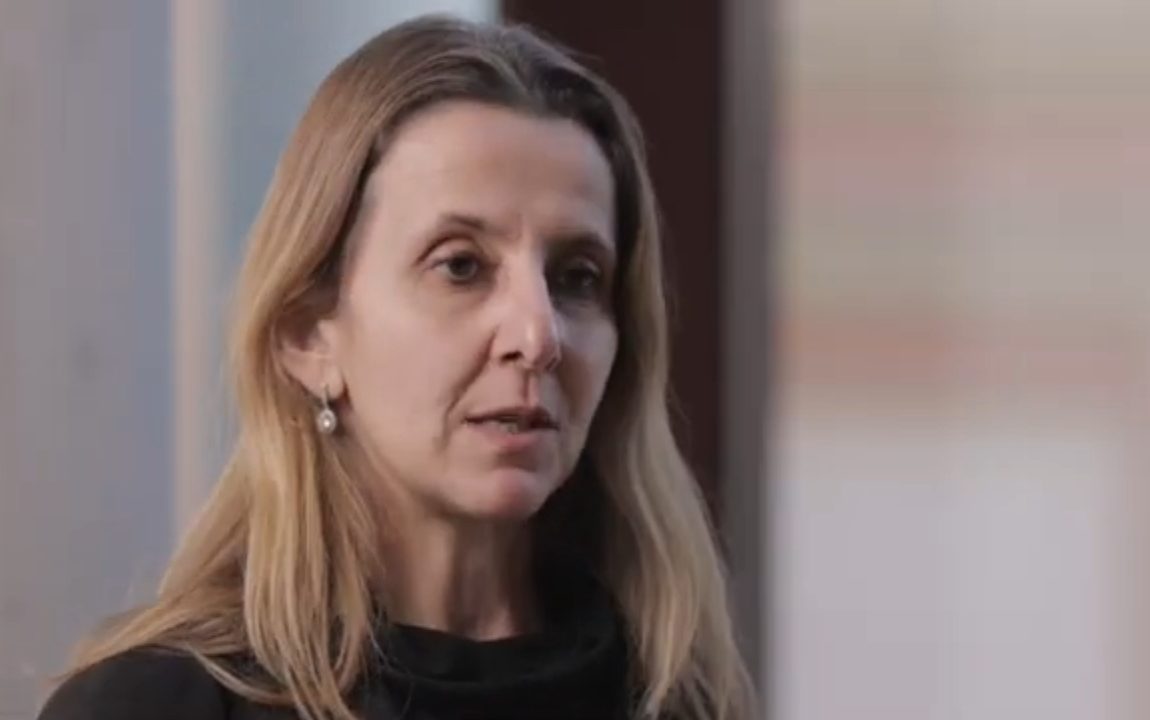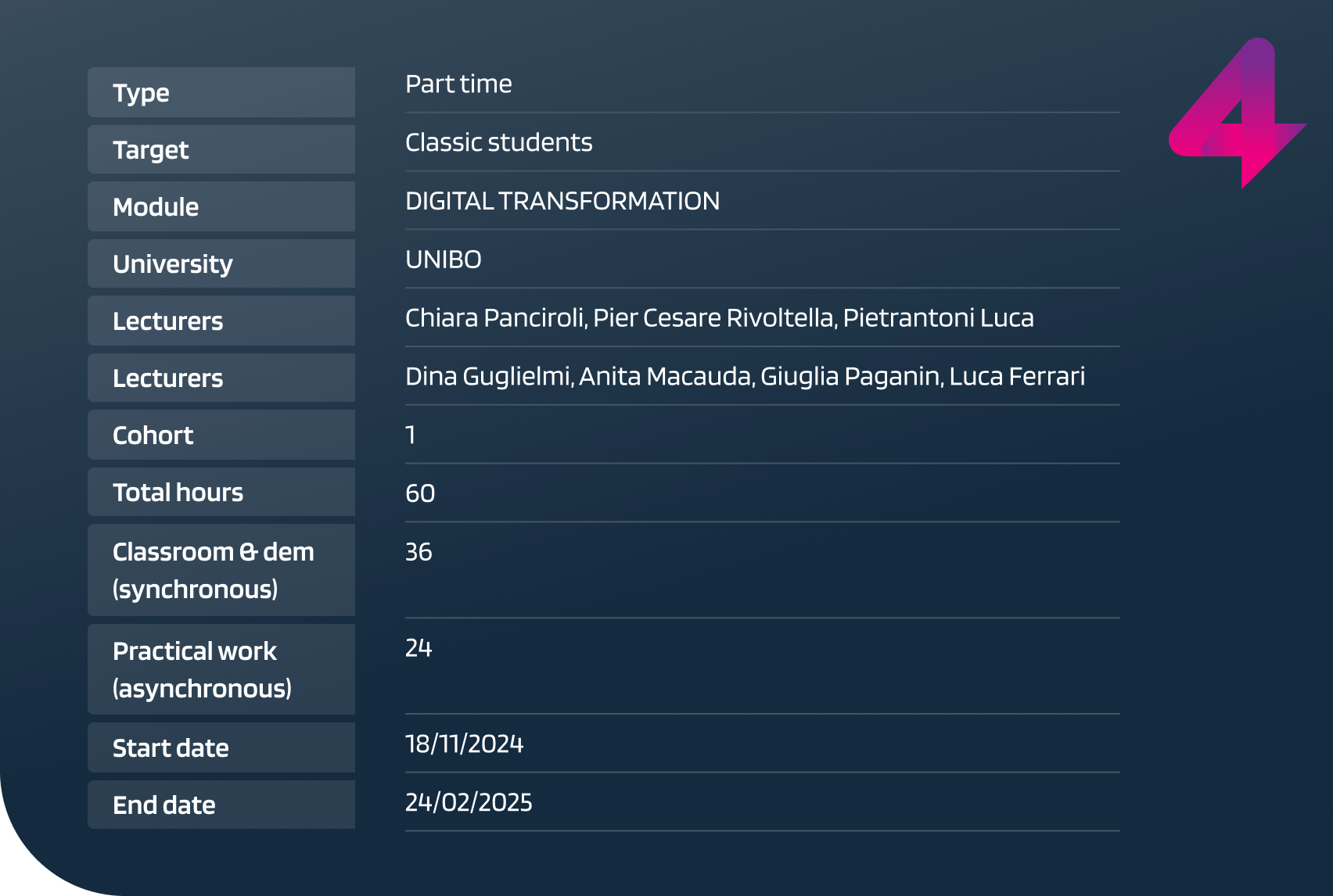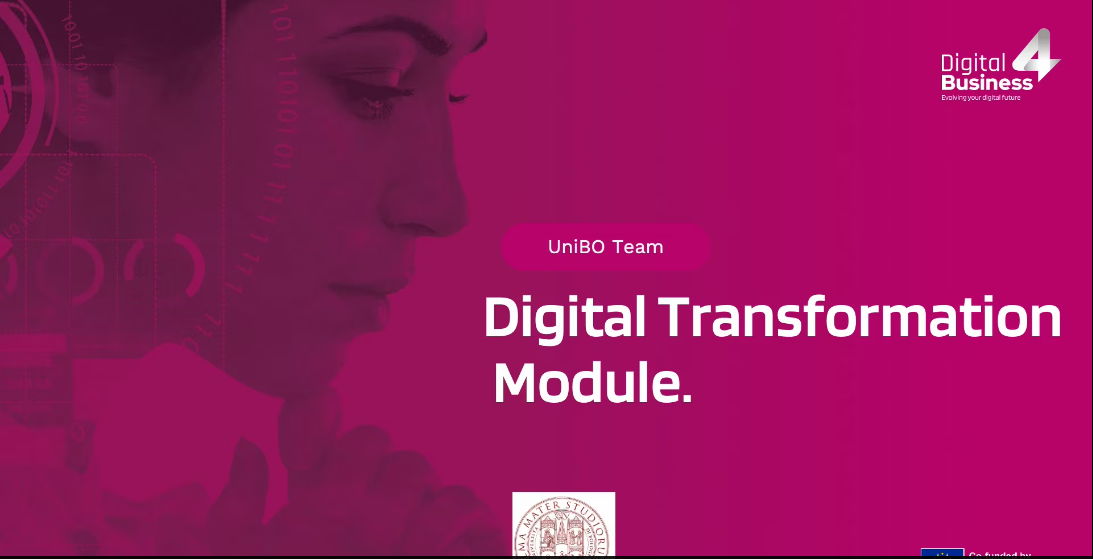Master the core concepts and strategies of digital innovation
Explore the world of Digital Transformation with our comprehensive module that’s a key pillar of the Digital4Business master’s programme
This course empowers you to understand, discuss and master the core concepts and strategies of digital transformation. You’ll explore innovative business models, critically assess digital paradigms, and define strategic resource deployment for impactful change. Through practical exercises and real-world simulations, you’ll design and implement cutting-edge strategies. Equip yourself with the skills to lead and navigate digital transformation, and seize opportunities in the dynamic digital business landscape. Join us and become a digital transformation leader.
Key Details
The Digital Transformation module delivers a cutting-edge online learning experience, blending hybrid learning with the expertise of top-tier tutors. Dive into dynamic synchronous lectures and flexible asynchronous activities, enriched with collaborative group projects, hands-on exercises, and immersive lab sessions.
All your progress is tracked through a state-of-the-art online e-portfolio. Harness the power of work-based learning, problem-based learning, gamification, and flipped classroom techniques, all enhanced by the latest in artificial intelligence. This innovative approach will give you a stimulating, practical learning experience, equipping you to thrive and lead in the ever-evolving digital business world.
Classroom and demonstrations: 36 hours
Practical work/tutorials: 24 hours
Independent learning: 190 hours
Total: 250 hours
Credit points
10 ECTS
Subjects covered
The Digital Transformation module is a 10 ECTS course, conducted over 12 weeks with 3 hours of lectures per week. Here’s an overview of the topics to be covered:
- Introduction to Digital Transformation
- Basic concepts of digital transformation.
- Evolution stages of digital transformation.
- Economic and social impacts.
- Digital paradigms and platform economy.
- Ethical issues in digital transformation.
- Interdisciplinary connections.
- Technologies and Innovations
- Emerging digital technologies (AI, Blockchain, IoT).
- Strengths and weaknesses of main digital technologies.
- Evolution of AI.
- Big Data and Platform Society
- Platform-based business strategies.
- Platform economy case studies.
- Digital and data literacy.
- Digital Competences
- Digital competences framework.
- Digital communication skills and capabilities.
- Upskilling and reskilling.
- Sustainable Development Goals (SDGs) Framework and Digital Transformation
- Ethics and sustainability in the digital age.
- UN SDGs.
- Digital projects supporting SDGs.
- Circular economy.
- KPIs for digital sustainability.
- CSR and social impact.
- Digital Transformation Design: Methodologies and Tools
- Industry trends in digital transformation.
- Tools and methodologies for organisational culture and innovation.
- SWOT analysis.
Learning objectives
This dynamic module is aimed at business leaders, professionals and graduates from all across Europe. It is designed to empower you with cutting-edge skills in business and digital transformation. By the end of the course, you’ll not only grasp the essential concepts but also be ready to lead innovative changes in the digital era. Here’s what you’ll achieve:
- Analyse and synthesise the key concepts and enablers of digital transformation.
- Critically evaluate digital transformation paradigms and their impact on innovative business models.
- Assess and strategise the deployment of strategic resources for digital transformation.
- Design and implement advanced strategies for digital business transformation.
Module leader
Scientific responsibility: Chiara Panciroli, University of Bologna
Chiara Panciroli is a Full Professor at the Department of Education Studies (Giovanni Maria Bertin) at the University of Bologna, specialising in Methodologies of Teaching and Special Education (M-PED/03). Her academic journey includes a Bachelor of Science and Education and a PhD in Pedagogy. Panciroli has held positions as an Associate Professor and Full Professor at the University of Bologna since 1998.
Chiara teaches courses such as Theories and Tools of Didactic Mediation, Museum Teaching, Iconography and Iconology, and Teaching Tools and Communication in Museum Environments. She also contributes to the Doctoral School of General Teaching, focusing on Care in education and Teacher professionalism in nursery schools.
Chiara’s research includes leading European projects like Promote Education, Participation and Projects for Youth (PEPPY), INTERSTICE, and FADING, and her recent publications address the intersection of education and artificial intelligence. She is an active member of several specialist bodies and research groups, contributing significantly to educational research and practice.
Prof Panciroli also has the position of Head of the AI and Education scientific unit of the Interdepartmental Research Centre Alma Mater Research Institute For Human-Centred Artificial Intelligence (Alma Human AI).

Module leader
Marika Mascitti, University of Bologna
Marika Mascitti is a Research Fellow at the Department of Educational Sciences of the University of Bologna. She conducted her PhD in Educational and Social Theory and Research at the Roma Tre.
University with a dissertation on Gamification and Game-based learning as strategies to promote pro- environmental behaviours. Her research interests revolve around Media Education, Innovative teaching methods and Education for Sustainable Development.


Module calendar avalability
The classes are divided into 12 weeks. The first class will be on 18 November 2024 and the last on 24 February 2025.
All classes will be from 15:30 to 18:30 CET.
Download calendarOpening up new digital opportunities
This module is ideal for business leaders, professionals and graduates seeking to excel in implementing effective digital strategies. It opens career paths in digital innovation management and leadership roles in technology-driven industries.
Our master’s programme and micro-credentials offer a diverse range of modules that complement the Digital Transformation course. Discover how you can enhance your expertise and advance your career by exploring the full spectrum of courses available at Digital4Business.
Our Programme
Part of the Digital4Business ecosystem
This exciting module is a key part of the Digital4Business programme, a €19.9m EU-funded online master’s designed to shape the digital leaders and strategists of tomorrow. Learn how digital transformation drives business innovation and efficiency, and gain the expertise needed to lead in the digital era.
 Your Resources Hub
Your Resources Hub
We’ve gathered all the essential resources you’ll need to navigate your Master’s journey. Whether you’re looking for an overview of the course structure, key dates or detailed programme information, it’s all here for you.
FAQs
Relevant EQF Level 6 qualification required in a relevant field including but not limited to: computer science, IT, engineering, maths, business, or economics. Without this you will have an interview and assessment to evaluate certifications, qualifications or professional experience.
Minimum B2 English proficiency, plus 2 years’ work or education in an English-speaking environment. IELTS: 6.0; TOEFL PBT: 600; TOEFL CBT: 200; TOEFL iBT: 100. Alternatively, proficiency may be assessed via a test or interview
This EU co-funded programme is open to all EU27, EEA, UK and Ukrainian nationals with a passport or valid ID from one of these countries.









)